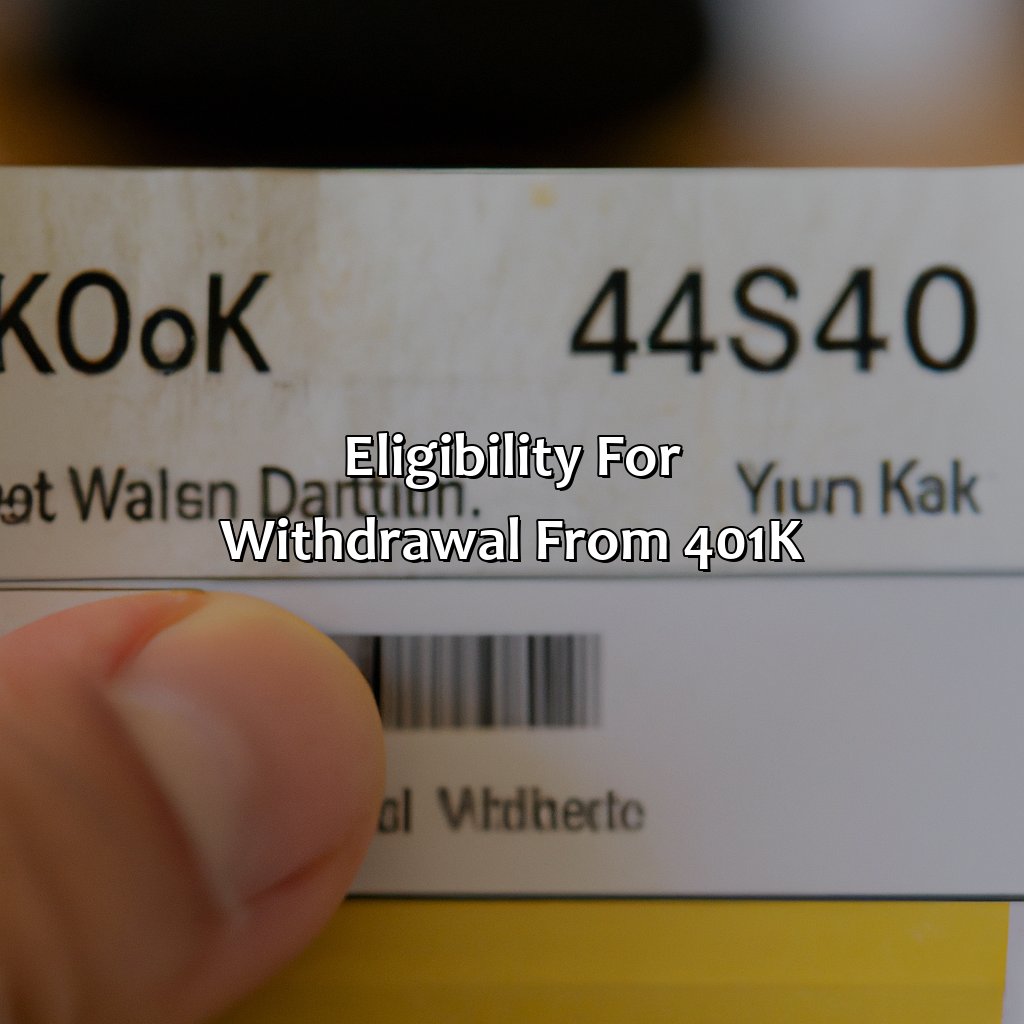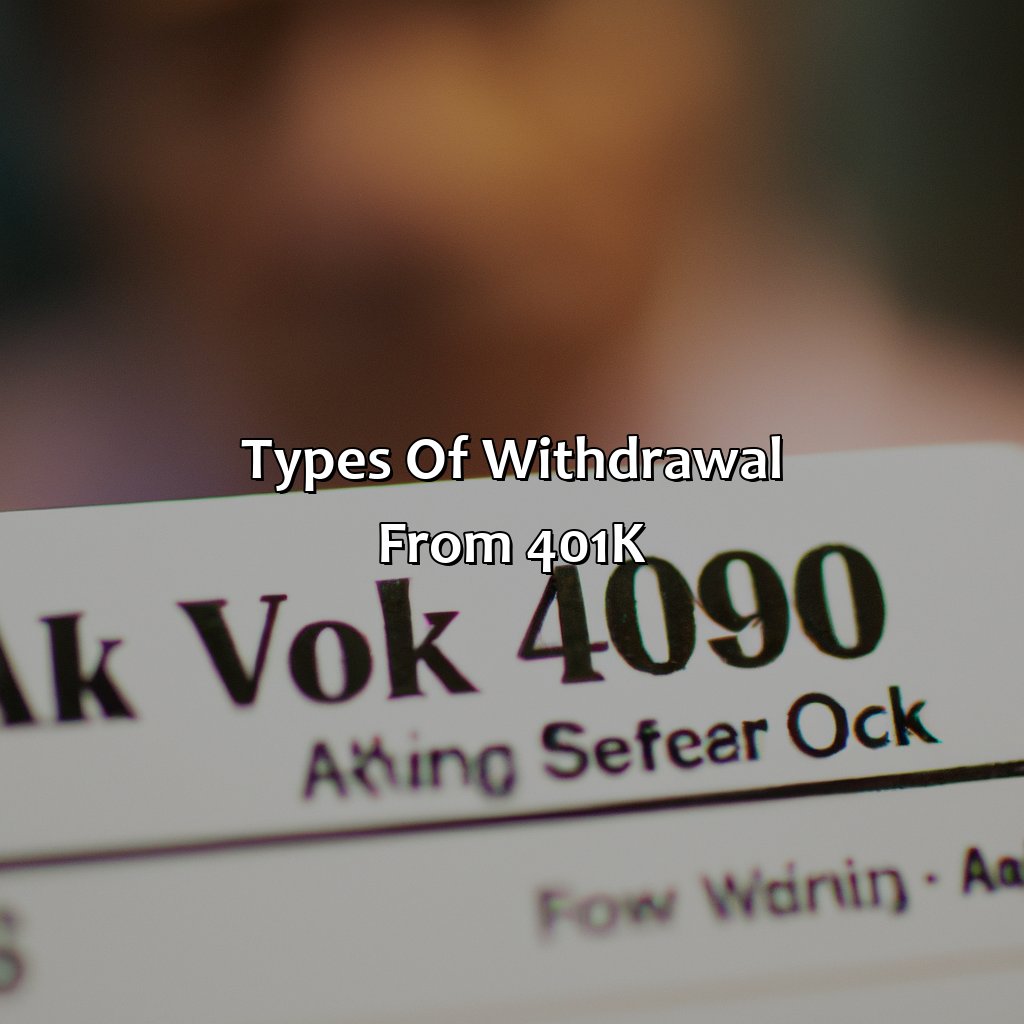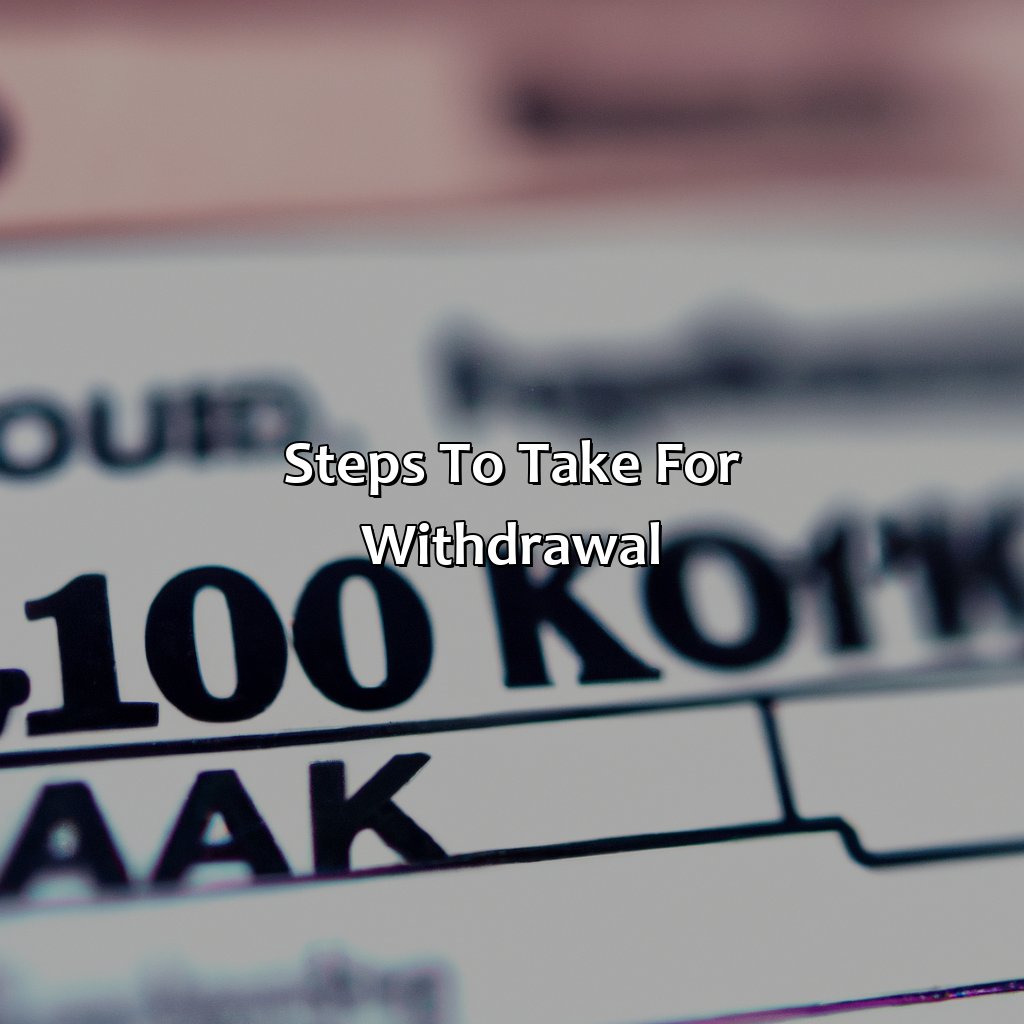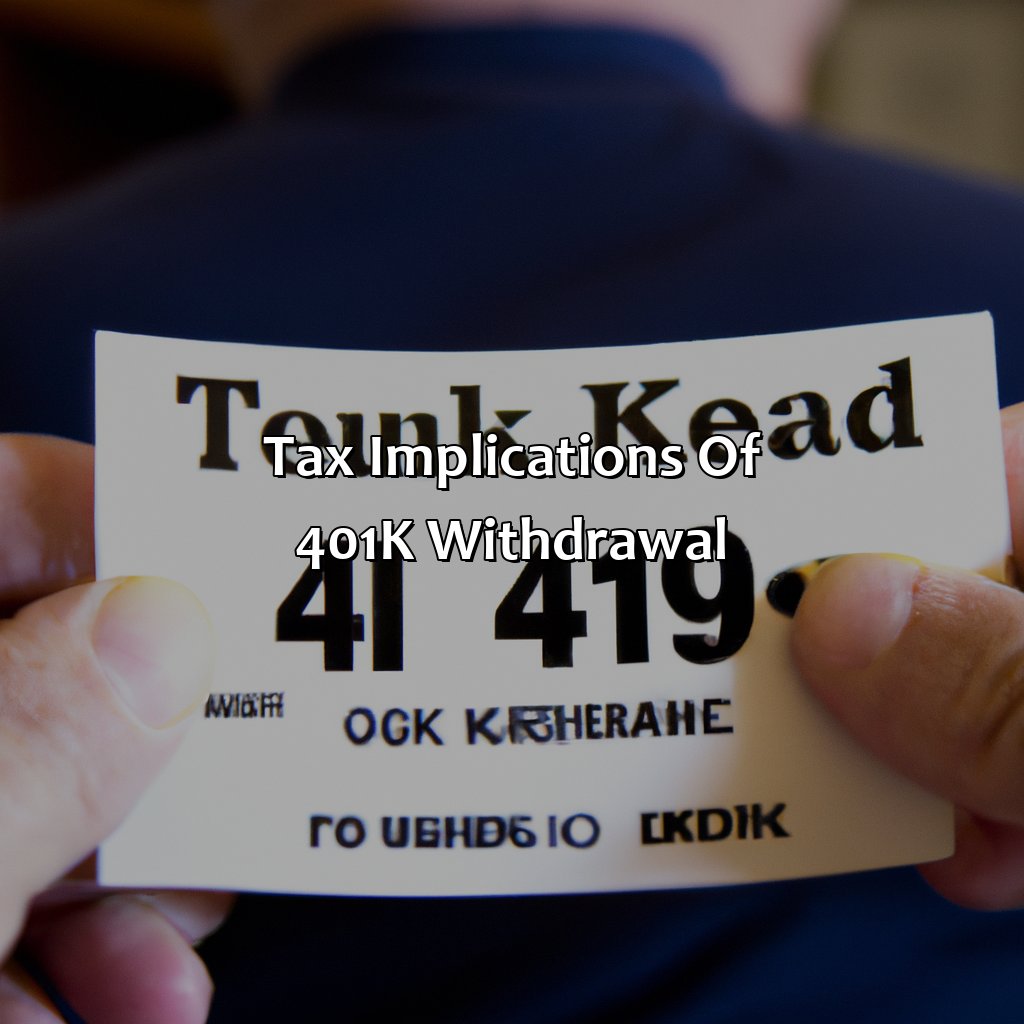How To Withdraw Money From 401K Before Retirement?
Key Takeaway:
- Eligibility for Withdrawal from 401k: To withdraw money from your 401k, you must meet age requirements or employment status requirements, or demonstrate financial hardship. Review your plan documents for specific eligibility requirements.
- Types of Withdrawal from 401k: There are three types of withdrawal from 401k: penalty-free withdrawal, hardship withdrawal, and early withdrawal penalty. It’s important to understand the differences and potential consequences of each type of withdrawal.
- Steps to Take for Withdrawal: To withdraw money from your 401k, review your plan documents, contact your plan administrator, and complete a withdrawal application. Be aware of the potential tax implications and penalties for early withdrawal.
Are you thinking of withdrawing money from your 401k before retirement? Withdrawing early can be complicated, but you can do it safely with the right information. This article will walk you through the steps needed to withdraw money from your 401k.
Eligibility for Withdrawal from 401k
Understand the criteria needed for successful withdrawal from your 401k account! Age, employment status, and financial hardship requirements all need to be met for eligibility. Get it right to get the money!

Image credits: retiregenz.com by David Jones
Age Requirements
Retirement Account Withdrawal Rules
To withdraw funds from a 401k account, an individual must ensure eligibility as per the IRS guidelines. These requirements vary based on the type of withdrawal and include age, employment status, and financial hardship. The age requirement for penalty-free withdrawals is 59½ years old or older.
In addition to age considerations, individuals can withdraw funds through a few other means such as death or disability. In case of financial hardship, participants may take out loans or make special withdrawals; however, these may come with penalties and tax implications.
It is important to note that IRA withdrawal rules differ from those of 401k plans and should be reviewed carefully to avoid unnecessary penalties. Seeking advice from a tax professional can help determine eligibility for withdrawing retirement funds.
Participants should monitor their accounts closely to ensure timely compliance with any withdrawal guidelines or changes. Taking advantage of employer-matching programs and contributing regularly can also help secure retirement savings for future use.
Whether employed or unemployed, as long as you have a 401k, you can still dream about early retirement and raiding your savings like it’s a candy store.
Employment Status Requirements
For those planning to withdraw money from their 401k plan before retirement, eligibility is contingent on employment status. You can only withdraw funds from your 401k if you are no longer employed by the employer sponsoring the plan.
If you quit or lose your job, you have the option to take a distribution from your 401k plan. However, if you are still employed but want to withdraw money, options may include a hardship withdrawal or loan dependent on your specific plan’s rules.
It’s important to note that taking an early withdrawal from your 401k can come with significant tax penalties and fees. Therefore, it’s crucial to weigh the pros and cons before making any decisions.
Remember not to rush into any decisions regarding withdrawals as they could affect long-term financial goals. Seek professional guidance in considering all relevant factors that may impact financial wellbeing.
Looks like you’ll need more than a stiff drink to meet the financial hardship requirements for early 401k withdrawal.
Financial Hardship Requirements
In certain instances, individuals may qualify for early withdrawal from their 401k plan due to financial hardship. This eligibility depends on the plan’s terms and may require proof of hardship circumstances like medical expenses or legal fees. Hardship withdrawals are generally limited to the amount needed and cannot exceed what is necessary to alleviate the hardship.
The most common categories of expense that fall under a company’s financial hardship requirements include medical bills, education costs, purchasing a principal residence, rent/mortgage payments and funeral expenses. Withdrawals made from 401k before retirement are subject to taxes and a 10% early withdrawal penalty if you’re under age 59½. Loans are also an option provided by many 401(k) plans while avoiding the penalty.
Lastly, it’s worth noting that taking funding earlier than planned outlays a larger cost in future investment revenue as you’re missing annual compound interest gains on tax-free funds. The safest play would be to avoid early withdrawals at all costs if not purely compulsory for circumstantial reasons- advised by The Balance.
Why settle for one way to withdraw from your 401k when you can have multiple options and a headache trying to decide which one to choose?
Types of Withdrawal from 401k
Know how to withdraw cash from your 401k before retirement? You must know the different kinds of withdrawal. In this part on “Types of Withdrawal from 401k,” we’ll check out penalty-free withdrawal, hardship withdrawal, and early withdrawal penalty. These subsections in this article will help you decide which is the best option for you to withdraw from your 401k early.

Image credits: retiregenz.com by Yuval Duncun
Penalty-Free Withdrawal
Withdrawal without being charged a penalty is a lucrative option for those who want to access their 401k savings before retirement. Penalty-Free Withdrawal is the term used for this kind of withdrawal method, and it is only applicable to individuals aged 59.5 years or more. This method is favored by taxpayers, and the IRS has created unique guidelines for early withdrawals.
Individuals are also allowed to take Penalty-Free Withdrawals when undergoing specific financial hardships, such as disability, medical expenses that exceed 7.5% of their adjusted gross income (AGI), or bankruptcy, among other things. The exemption necessitates meeting certain conditions and requirements set out in IRS Publication 590-B.
Additionally, Roth IRAs – a popular choice for savers as they offer tax-free qualified distributions – may be an alternative mechanism for retirees seeking to make Penalty-Free Withdrawals from their accounts.
To qualify for the exemption on Roth withdrawals, you must adhere to the account-holding criteria before making any withdrawals; otherwise, a penalty will be imposed. To make a Penalty-Free Withdrawal from a Roth IRA account, holders must have had an open account with funding sources for at least five years from January 1 of the present year. Furthermore, each distribution must meet at least one of the allowed categories defined by IRS regulations.
It’s best to consult with your plan sponsor or advisor because there might be additional costs aside from taxes depending on factors like age and retirement goals before making early withdrawals from your 401k account. Another advisable solution could be taking out loan options against your account instead of withdrawing funds improperly. Loans borrowed against 401k accounts are often deemed risk-free since they are paid back over an agreed-upon timeline with interest that goes back into your own investment account without any taxes incurred.
Therefore, if individuals opt for correct loans repayment plans or seek professional counsel first before opening a Roth IRA and structuring it according to IRS guidelines, they can successfully access Penalty-Free Withdrawals from their 401k accounts without incurring penalties. Looks like getting a hardship withdrawal from your 401k is the financial equivalent of pulling out your own teeth with pliers.
Hardship Withdrawal
Individuals may apply for a 401k withdrawal in times of financial hardship or unexpected expenses. This act is known as an ‘Early Withdrawal.’ It incurs a penalty and can only be done after demonstrating that alternative measures cannot suffice.
A 401k Hardship Withdrawal is when one removes funds from their retirement plan to aid them in pressing issues like medical bills, home repairs, tuition fees, etc. However, participants must meet the eligibility criteria—proof of an immediate and dire need where other sources cannot provide assistance satisfactorily.
This differs from loans as they must be paid back with interest incurred and have restrictions on reasons for the loan. Hardship withdrawals do not entail payback but limit future contributions and require tax payments.
To prevent needing early withdrawals on 401ks, consider increasing emergency funds (3-6 months’ worth) for unexpected expenses rather than resorting to inadequate retirement planning strategies like draining savings prematurely. Remember that withdrawing amounts before or during retirement will cause significant long-term financial damage and may result in paying higher penalties and taxes.
Who needs a punishment for early withdrawal when the crippling fear of not having enough money in retirement is punishment enough?
Early Withdrawal Penalty
Early Withdrawal Consequences:
Avoid withdrawing money from your 401k account before the age of 59.5, as doing so may result in Early Withdrawal Consequences. Your withdrawal will be subject to a 10% penalty and will also be taxed as ordinary income. However, certain circumstances like severe illness or disability may exempt you from these penalties and taxes.
In addition to Early Withdrawal Consequences, you should also consider the opportunity cost of withdrawing funds early. The longer your money stays invested in a tax-advantaged account like a 401k, the more it has the chance to grow through compound interest. Withdrawing money early can stifle this growth potential.
Fear of Missing Out:
While it may be tempting to withdraw funds from your 401k account early, consider the long-term consequences before making any hasty decisions. Speak with a financial advisor to discuss all of your options and determine whether an early withdrawal is truly necessary. Don’t let short-term needs lead to long-term regret – stay informed and make smart financial decisions for your future.
Get your paperwork in order and prepare for some serious adulting before dipping into your retirement savings like a rebellious teenager raiding their parents’ liquor cabinet.
Steps to Take for Withdrawal
- Before retiring, review your 401k plan documents.
- Contact the plan administrator.
- Then, complete the withdrawal application.
- Doing this will give you an insight into the process. Plus, it’ll make sure your request is managed easily.

Image credits: retiregenz.com by Harry Woodhock
Review Plan Documents
When considering withdrawal from your 401k before retirement, thoroughly evaluate your plan documents. Study the terms and conditions to learn about the rules and restrictions that govern early withdrawals. Familiarize yourself with the penalties, taxes, and procedures that may apply when taking money out of your account.
Reviewing plan documents will help you identify the factors that can affect your withdrawal eligibility. You must ensure that you satisfy any criteria set by the plan administrator, such as age or employment status. It’s also important to understand which types of expenses qualify for hardship withdrawals or loans.
In addition to eligibility requirements, be aware of any fees or expenses associated with withdrawal requests. Reviewing your plan documents ahead of time will inform you on how long it takes to process a request. This knowledge will help mitigate many risks.
Pro Tip: Prior preparation enhances efficient processing of withdraw requests. Keep abreast by regularly reviewing relevant plan documents so you can act without hassle in time-sensitive situations.
Don’t be afraid to bother the plan administrator – they’re getting paid to answer your questions, not sit around and watch cat videos all day.
Contact Plan Administrator
When considering withdrawing from a 401k plan before retirement, the first step is to get in touch with your plan administrator. They will provide you with valuable information about the withdrawal process and can guide you through the necessary steps.
The plan administrator can explain the rules and regulations concerning early withdrawals and help you understand any applicable penalties or taxes. They can also discuss alternative options that may be available to you, such as loans or hardship withdrawals, depending on your specific circumstances.
It is important to note that each plan has its own set of rules and requirements for early withdrawals, so it is essential to clarify all details with your administrator. They can advise you on how much money you are eligible to withdraw and the timing of your withdrawal based on your unique situation.
To ensure a smooth process, be prepared to provide them with all necessary documentation beforehand, such as identification and account information. By reaching out to your plan administrator early on in the process, you can minimize any potential issues or delays during the withdrawal procedure.
Fill out that withdrawal application like it’s the last tax form you’ll ever fill out…because it just might be.
Complete Withdrawal Application
Submitting an application for complete withdrawal of funds from a 401k account is crucial when you need to access your retirement savings before retirement. The withdrawal process can vary depending on the plan’s details and your employer’s requirements.
You must fill out a Comprehensive Withdrawal Form, providing information that proves your eligibility and reasons for withdrawing the funds. You may have to attach documents, such as medical bills or foreclosure notices, according to existing plan policies. The application typically undergoes review by the company handling the 401k account before approval or denial.
It is essential to follow each step in submitting your Comprehensive Withdrawal Form accurately and efficiently for timely access to your funds. Remember that incomplete forms or missed deadlines can result in significant fines and taxes incurred after withdrawal.
Completing the withdrawal application correctly will ensure a positive outcome for accessing your 401k retirement savings early. Do not hesitate to seek assistance from experts or employers if you need help along the way. Take action now and secure your financial future without missing out on opportunities.
Withdrawal from your 401k may bring you joy now, but the tax implications will haunt you like the ghost of Christmas past.
Tax Implications of 401k Withdrawal
Tax implications of withdrawing from a 401k before retirement? You must know about income taxes, early withdrawal penalties, and any exceptions and exemptions. These subsections provide answers to your worries about a lower payout. They’ll help you get around tax rules and regulations.

Image credits: retiregenz.com by David Washington
Income Taxes
When considering withdrawing from your 401k plan early, it’s important to understand the potential Income Tax implications. The amount of tax you’ll have to pay on a 401k withdrawal depends on your current tax bracket and the amount you’re taking out.
Withdrawal from a 401k before retirement can result in an early withdrawal penalty, which is an additional tax of 10% on top of ordinary income taxes. Some exceptions apply, such as disability or death.
If you’re in a lower tax bracket now than you will be in retirement, it may make sense to delay withdrawals until then. Alternatively, if you think your income tax rate will be higher in the future due to changing circumstances like rising income or tax law changes, withdrawing soon may be optimal.
Making contributions to other types of retirement accounts could also provide significant benefits by reducing your taxable income, resulting in more modest tax liability during withdrawal in the future.
To avoid detrimental impacts from your decision to withdraw money from your 401k consider consulting with a financial advisor who will help analyze different options and ensure that your choice suits your long-term financial objectives.
Break your piggy bank instead of your 401k, or face the early withdrawal penalties.
Early Withdrawal Penalties
The consequences of withdrawing money from your 401k before retirement can result in significant penalties. Unauthorized withdrawals from a 401k plan before the age of 59 and a half will incur a ten percent early withdrawal penalty, as well as income tax on the withdrawn amount.
It is essential to note that there are some exceptions to this rule. For example, if you have experienced substantial medical expenses or financial hardship, the IRS may waive the early withdrawal penalty. However, you will still need to pay taxes on the disbursed funds.
In addition, individuals who separate from their employers after reaching age 55 may be exempt from paying the early withdrawal penalty. This is known as the “age 55 rule.” According to Bankrate.com’s article “Retirement plans: Early distribution rules,” “if an individual separates from service with an employer voluntarily or involuntarily in or after the year they reach age 55, they do not have to pay the early distribution penalty.”
The only thing worse than taxes on your 401k withdrawals is realizing you don’t qualify for any exceptions or exemptions.
Possible Exceptions and Exemptions
Certain circumstances can allow individuals to withdraw money from their 401k before retirement without facing penalties and paying high taxes. These exceptions may include disability, medical expenses, separation from service, and hardship withdrawals. However, it’s always best to consult with a financial advisor to understand the tax implications of each exception and exemption.
In addition to these exceptions, some individuals may qualify for exemptions that waive the 10% early withdrawal penalty. Some of these exemptions may include taking distributions as part of an approved series of substantially equal payments or using the funds for a first-time home purchase or higher education expenses. Again, it’s important to seek professional guidance before making any decisions regarding your 401k withdrawals.
It’s important to note that even if an individual qualifies for an exception or exemption from early withdrawal penalties, they will still be responsible for paying income taxes on the distributed amount. It’s crucial to have a clear understanding of your tax obligations before making any moves regarding withdrawing money from your 401k.
According to Forbes Magazine, due to COVID-19 relief efforts, individuals are allowed up until July 15th,2021 to take up to $100K out of their IRA/401k accounts without penalty or mandatory withholding taxes as long as certain eligibility requirements are met.
Looking for alternatives to 401k withdrawal? How about investing in a time machine and going back to warn your past self about the consequences of not saving enough?
Alternative Options
Explore alternative options to withdraw money from 401k pre-retirement. Consider taking out a loan, rolling over to an IRA, or delaying retirement.
- Loans from 401k let you borrow from your retirement account.
- Rollover to an IRA gives you more control over funds.
- Delaying retirement avoids early withdrawal penalties.

Image credits: retiregenz.com by Joel Woodhock
Loans from 401k
401k Withdrawal Options- Utilizing Loans from Retirement Plan
When considering ways to withdraw money from your 401k before retirement, taking a loan from your retirement plan is one option.
Some essential points to keep in mind about loans from 401k include:
- The loan must be repaid with interest, unlike withdrawals, which involve penalties.
- The maximum amount you can borrow is typically limited to 50% of your account balance or $50,000, whichever is less.
- Loan repayment terms vary by plan but are generally five years or less.
It is important to note that while loans provide a relatively simple method of withdrawing funds early from your 401k, they do come with their own set of challenges and considerations.
If you default on the loan repayment schedule established by the plan’s administrator, any outstanding amount will be considered a withdrawal. Taxes and penalties will apply if you fail to repay the borrowed amount as per the schedule.
Therefore it is crucial to have a repayment strategy in place before borrowing against your retirement plan.
One suggestion for utilizing loans from a 401k could involve creating an achievable payment plan based on future income streams and cost-cutting strategies. Calculating how much interest might accrue over a given period provides insight into how long it may take you to pay back the loan fully.
By considering these crucial factors, borrowers can weigh their options properly and understand whether obtaining loans from 401k make practical sense for them.
Rollover your 401k to an IRA, because who needs retirement when you can just live off the interest payments forever?
Rollover to IRA
Transferring funds from a 401k account to an IRA account can have many advantages, including flexibility, investment options, and potential tax benefits. By rolling over your existing 401k balance into a new or existing IRA account, you may be able to access a wider range of assets and investment strategies. It may also give you the ability to consolidate multiple retirement accounts in one place.
The process of rolling over your 401k balance into an IRA is straightforward but requires careful consideration and planning. You’ll need to choose between a traditional or Roth IRA account and select a custodian for your funds. Once these decisions are made, you’ll need to initiate the rollover process with your current 401k provider.
It’s important to note that while rolling over from a 401k to an IRA is generally considered beneficial, it’s not always the right choice for everyone. Some individuals may prefer to leave their funds in their employer-sponsored plan due to factors such as low-cost investment options or unique withdrawal provisions.
If you’re considering a rollover to an IRA, be sure to explore all your options thoroughly and consult with a financial advisor before making any decisions. With proper planning and guidance, transferring your funds to an IRA can be an effective way to optimize your retirement savings strategy.
Delaying Retirement
For those who wish to prolong their work life, there are alternative options to Delay Retirement. One way is to Withdraw from 401k before the standard age of retirement. This option allows you to access your savings early and can provide financial flexibility.
To withdraw money from a 401k, you must meet certain requirements such as experiencing hardship or leaving your job. It can affect taxes and penalties, so it is essential to seek professional advice beforehand. Another option is taking out a loan from your 401k, whereby you repay the amount borrowed with interest.
It’s important to note that withdrawing from a 401k before retirement should not be taken lightly as it affects future retirement funds. Ensure you weigh the pros and cons and assess if it aligns with your long-term financial goals.
I recall speaking with a co-worker who withdrew from his 401k due to unforeseen medical bills, which dramatically impacted his retirement savings in the long run. It’s imperative to consider all alternatives before making any drastic decisions.
Some Facts About How To Withdraw Money From 401k Before Retirement:
Withdrawing money from 401k before age 59 and a half may result in a 10% early withdrawal penalty. (Source: IRS)
There are some exceptions to the early withdrawal penalty, such as disability, medical expenses, or first-time home purchase. (Source: Fidelity)
401k withdrawals are subject to income tax, so it’s essential to plan for tax implications. (Source: The Balance)
Some 401k plans allow for loans rather than withdrawals, which can have lower fees and interest rates. (Source: Investopedia)
Withdrawing from 401k early can have long-term consequences on retirement savings, so it’s important to consider other options first. (Source: CNBC)
FAQs about How To Withdraw Money From 401K Before Retirement?
1. How to withdraw money from 401k before retirement?
Withdrawing money from your 401k before retirement can be done through a process called a “hardship withdrawal”. This allows you to access the funds in your account for emergencies, medical expenses, or other financial hardships. However, this option should be used as a last resort, as it may come with penalties and tax consequences.
2. What are the penalties for withdrawing money from 401k before retirement?
There are a few penalties associated with withdrawing money from your 401k before retirement age (59 1/2). First, you will be subject to income taxes on the amount you withdraw. Additionally, you may be hit with a 10% penalty for early withdrawal. These penalties can add up quickly, so it’s important to carefully consider whether a hardship withdrawal is the best option for your financial situation.
3. Are there any exceptions to the penalty for early withdrawal from a 401k?
Yes, there are a few exceptions to the 10% penalty for early withdrawal from a 401k. These include a disability that prevents you from working, certain medical expenses, or if you are using the funds for a first-time home purchase. However, even if you qualify for an exception, you will still be required to pay income tax on the amount you withdraw.
4. Is there a limit on how much you can withdraw from a 401k before retirement?
Yes, there are limits on how much you can withdraw from your 401k before retirement. Generally speaking, you can only withdraw the amount that you can show is necessary to cover your financial hardship. Additionally, you may be required to provide documentation to prove your hardship, such as medical bills or proof of job loss.
5. How long does it take to receive a hardship withdrawal from a 401k?
The process for receiving a hardship withdrawal from your 401k can vary depending on your employer’s plan administrator. In general, you can expect the process to take at least a few weeks, as you will need to provide documentation of your hardship and wait for approval from your employer. It’s important to plan ahead if you think you may need to use this option in the future.
6. Will taking a hardship withdrawal from my 401k affect my retirement savings?
Yes, taking a hardship withdrawal from your 401k can have a significant impact on your retirement savings. First, you will be withdrawing money that was earmarked for retirement, which means less money will be growing in your account over time. Additionally, you may be subject to penalties and taxes that further reduce your savings. It’s important to carefully consider the consequences before taking a hardship withdrawal.
 Checkout this IRS Loophole
Checkout this IRS Loophole 






